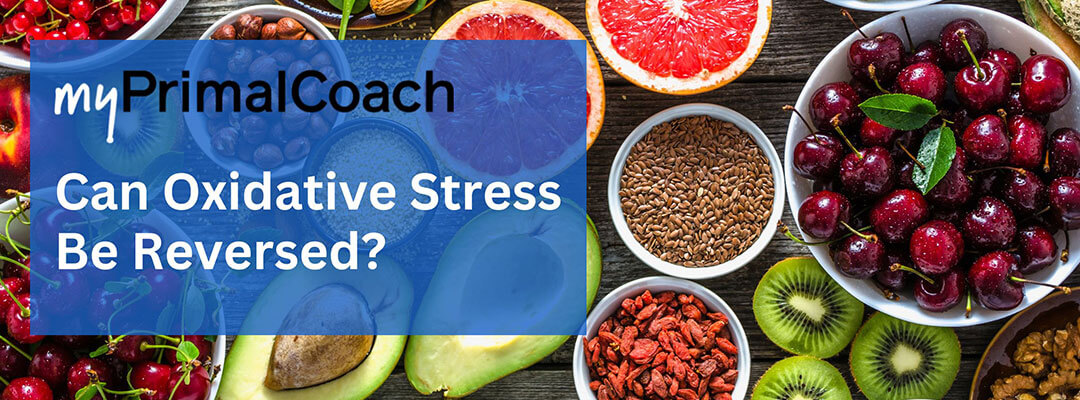Whether or not you’re familiar with oxidative stress, it sure doesn’t sound good and begs the question: Can oxidative stress be reversed? While it may not sound like something beneficial to us, oxidative stress is a natural and necessary function. It serves as a protective reaction for us, and our bodies have systems in place to help make it work for, and not against us. It all comes down to one word: balance.

Can oxidative stress be reversed? Yes it can! Read on the learn how.
Before we delve into whether oxidative stress can be reversed, let’s first explore what it is, the lifestyle factors that contribute to it, and its potential undesirable effects.
What Is Oxidative Stress?
Simply put, per a review published in Metabolism, oxidative stress is when the free radicals and antioxidants in your body are out of balance. Why is this a bad thing? Well, this imbalance can cause an unhealthy immune response against your own body. This can lead to:
Cellular damage
Tissue damage
Up-regulation of proinflammatory genes (such as tumor necrosis factor and nuclear factor-kB)
Up-regulation of adhesion molecules
Cellular aging
Who wants any of that?
What Are Free Radicals and Antioxidants?
Free radicals are harmful compounds that can damage our cells and interfere with our body’s proper functioning. Simple daily tasks our bodies undertake such as breathing, exercising, digesting food, and turning fats into energy produce free radicals.
Free radicals contain oxygen and chemically react easily with other molecules. This reaction is called oxidation. Our body has many mechanisms in place to protect us from free radicals and their damage—one being antioxidants. Antioxidants stabilize oxygen free radicals and make them less reactive, in a process known as free radical scavenging.
When all is operating smoothly, our body’s natural antioxidant system will put a halt to the chemical reactions and destroy the free radicals.
Because free radicals are essential to life, yet simultaneously causing damage, that delicate balance with antioxidants is imperative.
Effects of Oxidative Stress
When the balance between antioxidants and free radicals becomes askew, this can lead to pathologically high levels of oxidative stress and is linked to several diseases, including:
Cancer (such as pancreatic cancer)
Neurodegenerative disorders (such as amyotrophic lateral sclerosis, multiple sclerosis, Parkinson’s disease and memory loss)
Brain oxidative stress and oxidative stress-induced cognitive impairment (which has been linked to aging-related Alzheimer’s disease)
Chronic heart failure
Cardiac hypertrophy
Cardiovascular death from coronary artery disease (through the formation of atherosclerotic plaques)
Rheumatoid arthritis
Kidney disease
Major depression
Chronic fatigue syndrome
High levels of low-density lipoprotein or LDL (often referred to as bad cholesterol)
Loss of skeletal muscle and lean body mass
Insulin resistance
Maternal diabetes
Lifestyle Factors That Can Cause Oxidative Stress
There are some unfortunate major risk factors that cause oxidative stress that are out of our control. A study published in the New England Journal of Medicine, showed that chemotherapy-associated oxidative stress and nucleoside reverse transcriptase inhibitors (NRTI)-induced metabolic complications from anti-HIV drugs are such contributors.
Factors that are considered pro-oxidizing can damage our DNA at a mitochondrial level, per a 2020 review published in Frontiers Physiology:
Industrial vegetable oils such as canola, soybean, peanut, and safflower. The fatty acids in vegetable oils are oxidized and unstable, resulting in oxidative stress to the body.
Smoking cigarettes. The link between cigarette smoking and oxidative stress is clear. The more cigarettes one smokes, the higher the oxidative stress.
Environmental toxins such as air pollution and mold. Exposure to water-damaged buildings and mold is known to trigger oxidative stress. In addition, air pollution particles have also been shown to induce a response.
Not getting enough sleep. A study published in 2006 found that chronic sleep deprivation can trigger an oxidative stress response in fruit flies.
Poor oral health. There is an association between oxidative stress and periodontitis, or infection of the gums. The infection may seep into the bloodstream and lead to systemic oxidative stress.
UV ray exposure. Excessive exposure to ultraviolet radiation emitted by the sun can lead to the development of oxidative stress
Not eating organic. Harmful chemicals and pesticides have been shown to stimulate free radical production
Medications like NSAIDs and antibiotics. Prolonged use of NSAIDs have been linked to increased oxidative stress. There is a connection between bacterial antibiotic use and the creation of oxidative stress.
High-sugar foods and beverages. Processed foods are riddled with sugar. The more sugar is consumed, the more the body needs to produce free radicals to process it.
Fried foods. A study found long-term consumption of fried food from fast food restaurants impacted oxidative stress markers.
Excess stress and anxiety. Anxiety disorders can lower antioxidant defenses.
Intense physical exercise. Exercise-induced oxidative stress may result from prolonged or high-intensity exercise. However, research shows it probably does not result in levels that are detrimental to our health.
Can Oxidative Stress Be Reversed?
You can’t avoid your exposure to free radicals, but you can take some measures to help your body maintain antioxidant balance against them and encourage enzymatic antioxidant activities and antioxidant gene expression.
There are two types of antioxidants—endogenous and exogenous antioxidants that come into play with oxidative stress.
Endogenous antioxidants are produced in our bodies, and are a byproduct of our metabolism. On the other hand, exogenous antioxidants, come from the food we eat.
Preventing exposure to harmful lifestyle factors while increasing the amount of antioxidant-rich foods in your diet can help counteract and reverse oxidative stress.
Foods that contain high amounts of antioxidants include:
Fruits and vegetables high in vitamin C:
Oranges
Bell peppers
Broccoli
Cabbage
Brussel sprouts
Kohlrabi
Snow peas
Cauliflower
Kale
Papaya
Strawberries
Pineapple
Kiwi
Mango
Fruits and vegetables containing beta-carotene
Carrots
Squash
Collards
Spinach
Sweet potatoes
Strawberries
Cantaloupe
Broccoli
Foods high in vitamin E
Spinach
Dandelion greens
Tomato sauce
Swiss chard
Turnip greens
Red peppers
Avocados
Eggs
Eel
Sardines
Tuna
Almonds
Sunflower seeds
Hazelnuts
Pine nuts
Brazil nuts
In addition to food sources of antioxidants, vitamin D administration, vitamin C supplementation, and vitamin E supplementation may be helpful if your levels of any are low.
These lifestyle factors can also boost your antioxidant levels:
Getting enough quality sleep
Not smoking cigarettes
Limiting alcohol consumption
Engaging in stress-management
Getting moderate exercise
Limiting sun exposure and wearing sunscreen
Summary
Yes, oxidative stress can be prevented and reversed! A healthy diet enriched with antioxidant-containing foods, reducing stress and improving sleep, will all pitch in to reduce oxidative stress in the body.
Consulting with your internal medicine physician to gauge your needs and working with a myPrimalCoach to administer diet and lifestyle changes is the first step to help you undo any damage and bring your body back to balance.
